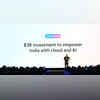Microsoft Chairman and Chief Executive Officer (CEO) Satya Nadella on Tuesday announced the technology major’s plans to invest $3 billion in India over the next two years, its biggest ever in the country, to expand its Azure Cloud and artificial intelligence (AI) capacity and boost skilling initiatives.
The investment, which will also include the establishment of new data centres, is part of the Redmond-headquartered firm’s push to support India’s growing digital economy.
India has become a key market for global tech majors Microsoft and its rivals like Google and Amazon Web Services (AWS) that are capitalising on the country’s 1.4 billion-strong population and its emerging digital economy. Amazon plans to invest $12.7 billion in its Indian operations by 2030, while Nvidia has tied up with Mukesh Ambani’s Reliance Industries to build AI infrastructure and an innovation centre in the country.
Microsoft’s India commitment follows the company’s recently announced plans to invest $80 billion on AI-enabled data centres in 2025.
The Hyderabad-born Microsoft CEO, who is on a two-day visit to India, met Prime Minister Narendra Modi on Monday. The company said this investment aims to accelerate AI innovation in India, which is pivotal for achieving Prime Minister Narendra Modi’s vision of a developed India (Viksit Bharat) by 2047.
Also Read
Microsoft also plans to train 10 million Indians in AI skills over the next five years through the second edition of its ADVANTA(I)GE India programme.
India is rapidly becoming a leader in AI innovation, unlocking new opportunities across the country. The investments in infrastructure and skilling we are announcing today reaffirm our commitment to making India AI-first, and will help ensure people and organisations across the country benefit broadly,” said Nadella at a company event in Bengaluru, which was attended by more than 2,000 people, mainly developers, tech executives, and startups.
I had a chance to meet PM Modiji yesterday (Monday) and it was great to listen to all his examples and his vision of driving the AI mission,” he said.
Nadella said India’s policies, the ‘India Stack’ (the country’s digital public infrastructure), its entrepreneurial energy, and its favourable demographics creates a virtuous cycle. “That’s why we feel fantastic about bringing core compute capabilities for next-generation AI,” he said.
In two to ten years, Nadella said, the focus would be on the correlation between gross domestic product (GDP) growth, at a country or industry level, and how efficiently one drives that equation. “For that, infrastructure needs to be the highest priority, and we are innovating in every layer of it,” said Nadella. “There is significant investment and innovation happening through us and our partners. I think of this as the golden age for systems when it comes to innovation.”
Microsoft is already seeing the demand for its technologies from several Indian clients, including Infosys, Air India, Apollo, Bank of Baroda, Federal Bank, Cognizant, Zomato, MakeMyTrip and IndiGo. For instance, IT firm Persistent uses Microsoft 365 Copilot’s “Contract Assist” to streamline negotiation processes.
In the past 12 months, Microsoft has been a copilot in making AI a reality in India, taking it from boardrooms to classrooms, commerce to communities, and finance to farmers,” said Puneet Chandok, president, Microsoft India and South Asia.
Today’s announcement strengthens our belief in India’s potential and our resolve to equip the country with the resources and future-ready skills needed to excel in the global marketplace. We will continue to use AI to unlock possibilities for the next few decades and ensure communities across the country have access to the computer they need to prosper in the AI era,” said Chandok.
AI will play a crucial role in meeting the $1 trillion digital economy target by 2028, which is expected to account for 20 per cent of India’s GDP. According to a Google-commissioned report, India can achieve at least Rs 33.8 trillion of economic value from AI adoption by 2030.
To support this growth, Microsoft plans to expand its Cloud and AI infrastructure, including data centre campuses. Currently, the firm operates three data centre regions in India, with a fourth set to go live in 2026.
As the nature of jobs evolves, AI is becoming an essential skill for professionals. In 2024, Microsoft launched the ADVANTA(I)GE India initiative initiative with the goal of training 2 million people in AI skills by 2025. Microsoft surpassed this target ahead of schedule with 2.4 million individuals trained in under a year.
This next phase of the programme will be delivered in collaboration with the government, non-profits, corporate organisations, and local communities.
Through the ‘AI for India’ mission, we aim to empower citizens with cutting-edge AI skills, driving innovation, creating jobs, and bridging the digital divide,” said Jayant Chaudhary, minister of state (Independent Charge), Ministry of Skill Development and Entrepreneurship.
In 2024, the Union Cabinet approved a Rs 10,371.92 crore “India AI mission” for five years to foster innovation in artificial intelligence through public-private partnerships.
On Tuesday, Microsoft Research (MSR) Lab unveiled an AI Innovation Network to strengthen the AI ecosystem in India. MSR aims to collaborate with digital-native companies to accelerate the development of real, usable business solutions. One such partnership is with edtech firm Physics Wallah to enhance math reasoning tools. Discussions are also underway on topics such as optimising Indic large language models (LLMs) and reinforcement learning.
Our collaboration with Microsoft Research is a step towards creating tools that understand and support each student’s learning journey,” said Prateek Maheshwari, co-founder, Physics Wallah.
Microsoft has also partnered with SaaSBoomi, a community for B2B startups, for AI innovation in Tier-II cities. Over the next five years, this tie-up aims to impact over 5,000 startups and 10,000 entrepreneurs, upskill more than 150,000 startup employees, create 200,000 new job opportunities, and attract an additional $1.5 billion in venture capital for India’s AI and SaaS ecosystem.

)